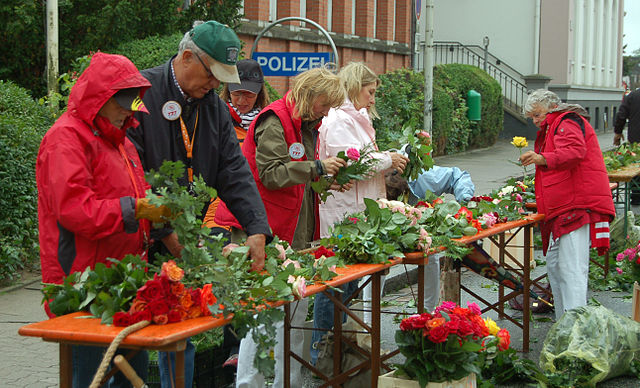Jenny Hall
Verses from the Dhammapada 53
Despite wanting to be better versions of ourselves we can still act impulsively. The Buddha showed that our future actions are the result of how we cultivate the heart. Jenny Hall tells a story to illustrate the point.

Floral designers at work in Germany... By Huhu Uet
Own work, CC BY 3.0, https://commons.wikimedia.org/w/index.php?curid=15698362
As many kinds of wreaths may be made from a heap of flowers, so many good deeds may be done in a life time.
As many kinds of wreaths may be made from a heap of flowers
During the coronavirus pandemic many are enjoying signs of Spring from their windows.
In our Close, we know when Spring is on its way when the cherry tree is in bud. Once the flowers have opened, within a week the blossom then falls like pink snow. Spring breezes blow it into swirling ‘garlands’ around the pavement. A child gathers and then scatters them like confetti. The Japanese appreciate the fleeting nature of the frothy pink flowers. The blossoms point to the Buddha’s teaching that nothing, including ourselves, is permanent.
They remind us to awake to each changing moment. This frees us from anxiety.
… so many good deeds may be done in a life time.
Unlike the cherry blossoms, we are rarely ‘in the moment’. We live in our thoughts driven by desire and hatred. We pursue what we believe suits ‘me’. If we attain it we attempt to cling to it, despite its transient nature. We strive to avoid what we perceive as inconvenient for ‘me’. We forget that this also eventually passes. All these fretful thoughts create the delusion of ‘me’. It is only when this delusion is emptied out that wholesome action appropriate to the situation is possible. The Zen training leads to this transformation. We are shown how to meet the churning and burning of desire and hatred and to allow it to burn ‘em’ away. When ‘I’ drops off, awareness of Buddha Nature opens up. In the following Japanese story, Sane and Sode express t’s never- failing warmth and compassion.
There were once a poor old man called Sane and his wife Sode. In their garden there was a beautiful cherry tree which delighted them. One day their little dog began to dig under it. He unearthed an ancient chest. When they opened it, the old couple discovered gold and silver treasure. Their nosey neighbour Bozo poked his head over the fence. Sane offered him some of the treasure immediately. Despite this generosity, Bozo was consumed by jealousy. His wife persuaded him to borrow their neighbour’s little dog. Bozo ordered the dog to dig for treasure in his garden. Eventually a chest began to appear. Unable to curb his excitement, Bozo kicked the dog out of the way. He continued to throw handfuls of earth at his wife’s feet. Suddenly the chest flew open releasing a swarm of insects. Bozo was so angry, he hit the dog with the spade and killed him. With great sadness, Sane and Sode buried the little dog under the cherry tree. That year there was a drought followed by a famine. However, the tree continued to grow. Its branches started to displace the tiles on the old couple’s roof. With regret Sane sawed off just one branch. Sode persuaded him to carve it into a grinding jar. Much to their amazement every time Sode placed a few grains of rice into it, enough powdered rice was produced to feed themselves, Bozo and his wife and the rest of their neighbours. Although no longer starving, Bozo’s wife persuaded him to steal the grinding jar. However, as soon as she placed the grains of rice inside, the room was full of a loud humming. Bees and wasps crawled into their ears and clothes. Bozo and his wife threw the jar onto the fire and ran out of the house. Hearing the noise, Sode and Sane rushed round to help their neighbours. With sadness they scooped up the remains of the jar, now reduced to ashes. Carefully they sprinkled them over the little dog’s grave under the cherry tree. Despite the cold, plants in the fields began to put forth shoots. Flowers appeared in the meadows. The cherry tree bloomed. All the villagers gathered in joy under the blossom.
There is reference in Buddhist teachings to the Alaya (seed repository consciousness). Within it are stored seeds of wholesome and unwholesome behaviour. Bozo and his wife were motivated by jealousy, covetousness and anger. The more such emotions drive action, the more unwholesome behaviour seeds are watered. The buzzing insects represent further negative deeds that follow. When such passions are contained rather than expressed, these unwholesome seeds are starved. Sane and Sode behaved selflessly. They shared the treasure and rice powder, they came to the assistance of their neighbours. These deeds were not planned. They were the Open Heart’s compassionate response to each changing situation. An example has been also the outpouring of help for the vulnerable in the covid 19 crisis. In such ways wholesome seeds are cultivated.
Recently, so many have lost loved ones. Many are separated from family and friends. Many feel isolated in their homes. In the Open Heart, free from ‘I’, there is no separation. We are all ‘one’, now and always. This is mirrored at the end of the story as villagers become ‘one’ under the pink blossoms against the radiant blue sky.
Basho expresses it:
Beneath the cherry
blossom
There are no strangers.
.................................................




































































